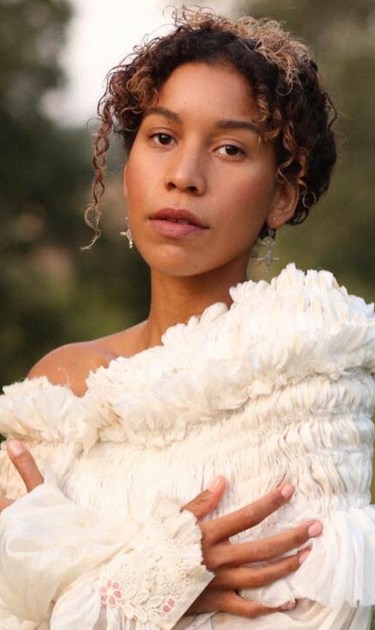Ever so gracefully, Charlotte Dos Santos brings to fruition a feeling of atmospheric longing within her music — something one might sense in the aroma of rainfall after clouds part ways. It’s tender and intimate, brutal and transformative. Her craft seeps together a fragile collection of distinct sonics and diary entries that intertwine so effortlessly that it might as well be a river bed needed after a drought. In hindsight, the independent singer, producer, and arranger is boundless, just like nature itself.
The fearless use of limitation is due to her heritage and kismet-like path towards music that’s surrounded the Oslo, Norway-bred artist for what has seemed like her whole life. Growing up with the polarity of Afro-Brazilian and Norwegian roots from her mother and father gave life to the poetic neo-soul, Latine jazz adjacent style she’s so keenly known for.
But, as Dos Santos puts it, growing up in Norway was “a lonely introspective journey,” especially not having the power to connect with her Brazilian roots right from the start. “My way of familiarizing myself with my culture was through music,” she tells Remezcla. “It also came through dance and rhythm. For me, that always felt like home.”
By 18, Dos Santos was already a self-proclaimed nomad, living and studying in England, New York, Valencia, and Berlin, attending the prestigious Berklee College of Music for jazz, where the foundations of classical training began. But during her year in Valencia, Spain, she studied Mediterranean music and Spanish flamenco, opening the portal to vibrant influences that impacted how Dos Santos sees and interprets the world.

Her first appearance in 2017 in the public eye was with the critically acclaimed soulful debut EP, Cleo, along with her COLORS performance of the stand-out jazz-influenced hit “Red Clay,” zooming over 400,000 views via YouTube. The nine-track EP also earned Dos Santos a Newcomer of the Year nomination at the Norwegian Grammy Awards, to no surprise due to its undeniable spark of rhythmic, therapeutic vitality.
Cleo, in its entirety, symbolizes courage, independence, femininity, royalty, and power, as she describes it. Even to this day, five years later, the soul crooner activates this symbolic freedom in every aspect of her life, especially while uplifting other female musicians of color. And recently, the passion for inspiring others came to light in this year’s featured artists of the American Society of Composers, Authors and Publishers (ASCAP) annual “On The Come Up” summer showcase. On her performance, Dos Santos displayed her chops for delectable R&B riffs while casting a warm ray over universal themes, from fallen partnerships to trust and betrayal, familiar concepts that seem to fall on women.
“The best part of the showcase was that we filmed the live session in Norway, which was also so special for me,” she says. With a stunning nature-esque backdrop for the live session, Dos Santos wanted to capture the essence of nature while filming in Oslo. So putting together the treatments for “Patience” and the Sade-inspired “Hello Hello” just seemed fitting for the affair — especially being her two new tracks from the debut album, Morfo, out Oct. 14.

Like most of humanity, the pandemic brought Dos Santos to an abrupt halt. She already had the foundations of her debut album, but abruptly, she tore it up in the pit of isolation and started anew. She reformed the footings of Morfo, a captivating record that she says feels like it’s Cleo 2.0. Although this time, she ingests classical orchestras, bossa-nova, funk, música popular Brasileira (MPB), soul, and funk into a ripe palette.
“My way of familiarizing myself with my culture was through music. It also came through dance and rhythm. For me, that always felt like home.”
“I felt bold enough to do it,” Dos Santos proudly conveys. “It took a while to bring everything together because some of the songs I wrote a while ago, and some of them were newer. There’s definitely a lot going on. But it’s also representing my head a little bit. It’s super chaotic sometimes — most of the time, actually. And in the end, it just took shape. This time, it means metamorphosis and transformation.”
Her most recent single, “Filha Do Sol” (daughter of the sun), finally nourishes the yearning to bond with her origins. Blending the Brazilian composer Edu Lobo’s “A Açoite Bateu,” Dos Santos puts her intricate spin on the bossa nova melody, the first song she’s written about her Afro-Brazilian heritage. The four-minute tune bursts with acoustic guitar, strings, and a harmonizing chorus in Portuguese, offering a direct homage to her lineage and something she describes as “intuitive and necessary” to make.

“Talking about my experiences with not just love but identity and a sense of belonging was important to me because I never had that. To kind of reclaim it was very important. Being Afro Brazilian and having Indigenous lineage, you have two extra identities. It’s something I carry with me every day. You still feel like you’re walking on that land even though you’re not there.”
In the end, all Dos Santos desires is a connection to her past, present, and future. And just maybe, she hopes she can breed the same inner desire in her fans, allowing them to flourish their truest identities unapologetically. “I like when people can listen and interpret things the way they want, and maybe my music can do for them what it fully needs to do as it did for me,” she concludes.




